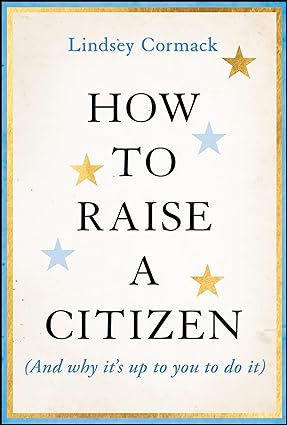Inside: Politics will feel unavoidable this coming election season. Teens and tweens will be exposed to all sorts of information, often for the first time. Here’s how to go about talking about politics, elections, and civic interest with your kids over the coming months.

Lindsey Cormack is the author of the forthcoming book, How to Raise a Citizen (And Why It’s Up to You to Do It).
Election seasons are full of debates, opinions, and heightened emotions. For parents, this time offers a unique opportunity to engage with their teens about their upcoming ability to vote, and a chance to model pro-civic behavior for tweens and younger children. For children to understand their role and potential effectiveness in a democracy, parents must take up the task of navigating election times in a mindful way.
Understanding Their Perspective
Teens are at a developmental stage where they are forming their identities and opinions. Over the coming months, those who are turning 18 or have recently will grapple with their first chance to participate in a United States election. The unfortunate truth about youth voting however, is that voter turnout in this age group is usually low. Statistics show that people aged 18-24 are the least likely to be registered to vote and the least likely to cast their ballot.
This lack of involvement is not because teens are uninterested in politics. Surveys indicate that they want to be able to voice their beliefs, but they lack the know-how. Additionally, in a time when teens feel overwhelmed by the barrage of information and the polarized nature of political information in the media, high schools are giving less time to civics instruction. Also, teachers are afraid of the possibility of parental blowback for even discussing basic governmental concepts, resulting in a cycle where our young people are trapped thinking that politics is too daunting and they don’t know how to be effective enough to change things.
No one likes to play a game they don’t know the rules to. And our politics won’t feel or function better if we don’t agree to learn about and teach our kids about how the system operates. This is where parents come in.
Related: Dear Parents of Seniors, My Best Advice for You (From Someone Who’s Been There)
Encouraging Engagement
One of the fundamental responsibilities we have as citizens is being informed. And all too often, our kids get the message that caring about politics and government is a waste of time. Our media derides politicians beyond valid points of criticism, and many times we as adults are quick to dismiss politics as boring, inconsequential, or too painful to try to figure out. This approach may feel good in the moment, but it’s not a reasonable long-term strategy.
The only way that we will get to a better politics is if more people—specifically more young people—feel like it matters to them, and that they have a way to get to outcomes they want. To make that possible, we must do what we can as parents to encourage this sort of learning and engagement, not keep our kids away from politics.
To encourage voting-eligible teens, parents can offer to research candidates’ platforms together (check out their social media!), or be willing to set aside time to talk about different parties, candidates, and races happening in their area. Yes, the presidential election will get top billing, but every member of the House of Representatives is up for election this year, as well as a third of the Senate, and many more state and local candidates.
Discussion as a Tool for Modeling Pro-Civic Behavior
We all know kids learn by observation. Parents can model pro-civic behavior by actively participating in the electoral process themselves and by showing their kids how to have conversations about politics.
In having political discussions, my plea to parents is that they remember this: we shape the way our kids dream. If we approach politics with disdain and find ourselves only talking about the negative aspects we encounter, we are more likely to raise kids who lean out, not into politics, and that means we’re not likely to get to a better place than we are today.
For teens and tweens who aren’t yet voting eligible, talking about issues and processes is fantastic practice and allows them to engage with the discussions that will be happening all over our media.
Open discussions about electoral processes such as primaries, partisanship, and voter registration can demystify the complexities of politics. Also, encouraging meaningful discourse about the platforms democrats, republicans, and other parties are running on helps your teen voter knows who they’re supporting. These sorts of talks can happen around the dinner table, during drives, or with targeted one on one time.
Related: You Need These Important Legal Forms When Your Child Turns 18
Teaching Voter Registration and Casting a Ballot
For young voters just turning 18, understanding how to register to vote and cast a ballot is a critical lesson parents must impart this year. Registering and voting is complicated, so teens will need a help the first time around. In many states the registration process can be completed online. But in states such as Texas where registration is required to be done by mail or in person, parents should offer to help their teens with this process.
Demonstrating how to fill out a registration form, what identification is needed, and how to check registration status online are practical things to review with your teen. Discussing how to read a ballot, understanding absentee voting versus in-person voting, and what to expect at the polling station can make the day of voting smoother for a first timer. Parents can even accompany their teens to the polls on election day to provide support and celebrate this important rite of passage.
The Benefits to Talking to Your Teens About Politics
Navigating the election season with your teen is not just about discussing politics; it’s about raising a well-informed and effective citizen. By showing that you are someone your child can turn to talk about issues, you’ll deepen your bond and learn things about one another. You’ll also make it more likely that your child sees themselves as effective in creating change, rather than disillusioned. And, in doing that work, you’ll be contributing to a better functioning society because when we know how things work, we are more able to come to solutions for the pressing political problems of our time.
Want to raise civic-minded teens who understand the importance of political engagement? Check out How to Raise a Citizen (And Why It’s Up to You to Do It) by Lindsey Cormack, now available for pre-order. In her book, Cormack offers a practical approach to discussing political issues and the inner workings of the U.S. government with children, while encouraging teens to vote.

Parenting teens is a tough job, but you’re not alone. These posts might help:
Please Check In on that High School Senior Who Just Graduated
The Best Documentaries To Watch With Your Teens and Tweens
Dear 18-Year-Old, You’re Now an Adult, But You Can Still Be a Kid
The Simple and Powerful Advice that Every High School Graduate Needs to Hear
*This post may contain affiliate links where we earn a small commission for purchases made from our site.






Leave a Comment